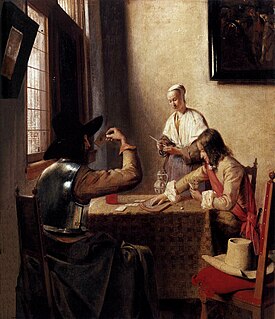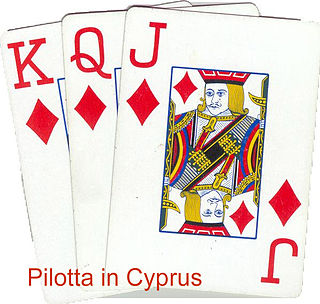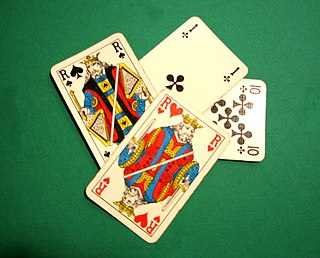Rules of Nines
Dealing
All of the cards are dealt one at a time into four hands of thirteen cards. One hand is for each player, and the remaining hand is set aside as an extra hand that the players can pick up (Four players can play, but with no option to trade hands, and only three tricks required to 'book', or keep the same score).
The extra hand
After all the cards are dealt, each player can look at his hand and decide if he wants to trade it for the extra hand. The dealer has first choice of taking the hand, and then the choice moves to the left. Players to the left of the dealer may take the hand that someone else has already traded in if they so choose.
Playing
The object of game play is to take tricks. Trump goes in the following sequence: Clubs, Diamonds, Hearts, Spades, No Trump (the first four are alphabetical). In some circles, the game runs Hearts, Spades, Diamonds, Clubs, No Trump.
Clubs, Diamonds, Hearts, Spades
Play starts with the player to the left of the dealer. Play always moves to the left around the table. The player who plays the highest card of the suit that was led is awarded the trick. Each player must follow suit if they can. If they are out of the suit that was led, they can either play a card from another suit (not the trump suit) and forfeit the trick, or they can play a trump card which will earn them the trick, provided nobody plays a higher trump. Play continues until 13 tricks are played, at which point all players will be out of cards.
The No Trump Hand
After the four trump hands, there is a hand that is played without trump. In this round, the tricks always go to the person who played the highest card of the same suit that was led. In all other aspects it is the same as regular play. So, for example, if the order of cards played was 10♦, K♠, Q♦, the trick would go to the person who played the queen.
Scoring
All players start the game with a score of nine, and the object is to bring one's score to zero (or lower). In each hand, the number of tricks a player has collected translates to the change that will happen to their score. If four tricks are collected, the score will remain the same. For each trick there is in excess of four, the player's score will go down by one. For each trick shy of four, the player's score will go up by one. So, three tricks will result in a score increase of one, six tricks will result in a score decrease of two, and it is possible to win the game in one hand by taking all 13 tricks, due to the score decrease of nine. This is quite rare. If you get three queens in a row it minuses points from your total score and adds points to other players total points.

Pinochle, also called pinocle or penuchle, is a trick-taking, Ace-Ten card game typically for two to four players and played with a 48-card deck. It is derived from the card game bezique; players score points by trick-taking and also by forming combinations of cards into melds. It is thus considered part of a "trick-and-meld" category which also includes the game belote. Each hand is played in three phases: bidding, melds, and tricks. The standard game today is called "partnership auction pinochle".

Sheepshead or Sheephead is an American trick-taking card game derived from Bavaria's national card game, Schafkopf. Sheepshead is most commonly played by five players, but variants exist to allow for two to eight players. There are also many other variants to the game rules, and many slang terms used with the game.

Euchre or eucre is a trick-taking card game commonly played in Australia, Canada, New Zealand, Great Britain, and the United States. It is played with a deck of 24, 28, or 32 standard playing cards. Normally there are four players, two on each team, although there are variations that range from two to nine players.

Spades is a trick-taking card game devised in the United States in the 1930s. It can be played as either a partnership or solo/"cutthroat" game. The object is to take the number of tricks that were bid before play of the hand began. Spades is a descendant of the Whist family of card games, which also includes Bridge, Hearts, and Oh Hell. Its major difference as compared to other Whist variants is that, instead of trump being decided by the highest bidder or at random, the Spade suit always trumps, hence the name.
Belote is a 32-card, trick-taking, Ace-Ten game played primarily in France and certain European countries, namely Armenia, Bulgaria, Croatia, Cyprus, Greece, Luxembourg, Moldova, North Macedonia and also in Saudi Arabia. It is one of the most popular card games in those countries, and the national card game of France, both casually and in gambling. It was invented around 1920 in France, and is a close relative of both Klaberjass and Klaverjas. Closely related games are played throughout the world. Definitive rules of the game were first published in 1921.
Pedreaux is an American trick-taking card game of the All Fours family based on Auction Pitch. Its most popular variant is known as Cinch, Double Pedro or High Five. Developed in Denver, Colorado, in the 1880s, it was soon regarded as the most important member of the All Fours family. Although it went out of fashion with the rise of Auction Bridge, it is still widely played on the western coast of the United States and in its southern states, being the dominant game in some locations in Louisiana. Forms of the game have been reported from Nicaragua, the Azores, Italy and Finland. The game is primarily played by four players in fixed partnerships, but can also be played by 2–6 individual players.

Krutzjass is a Swiss German trick-taking card game in some ways similar to Contract bridge. The name, literally translated into English, is Cross-Game, a name derived from the fact that it is played between two teams or partnerships of two, where team members sit opposite each other, with an opponent on either side. There are many variants of the game, however, this article deals primarily with the double-deck variant.

Bid Euchre, Auction Euchre, Pepper or Hasenpfeffer, is the name given to a group of card games played in North America based on the game Euchre. It introduces an element of bidding in which the trump suit is decided by which player can bid to take the most tricks. The primary differences are the number of cards dealt, absence of any undealt cards, the bidding and scoring process, and the addition of a no trump declaration. It is typically a partnership game for four players, played with a 24, 32 or 36-card pack, or even two decks of 24 cards each. It should not be confused with another game also called Bid Euchre q.v. Five Hundred.

Doppelkopf, sometimes abbreviated to Doko, is a trick-taking card game for four players. The origins of this game are not well known; it is assumed that it originated from the game Schafkopf.
Sueca is a 4 player-partnership point trick-taking card game of the Ace-Ten family, and a popular variant of the Bisca card game. The game is played in Portugal, Brazil, Angola and other Portuguese communities. Its closest relative is the very similar German game Einwerfen.

Bluke or Blook is a trick-taking card game known to parts of the East Coast and the Midwest and possibly other parts of the United States of America. The game features use of the Jokers, which are sometimes referred to as the Blukes.

Pilotta (in Greek Πιλόττα) is a trick-taking 32-card game derived from Belote. It is played primarily in Cyprus, being very popular among the Cypriot population, especially the youngsters, who usually arrange “pilotta meetings” in places such as cafés and cafeterias. Its counterpart played in Greece is named Vida.

Twenty-eight, also called "twenty nine" in some places is an Indian trick-taking card game for four players, in which the Jack and the nine are the highest cards in every suit, followed by ace and ten. In Maharashtra state, this is also called as 304.
304, pronounced three-nought-four, is a trick-taking card game popular in Sri Lanka, coastal Karnataka, Tamil Nadu and Maharashtra, in the Indian sub continent. The game is played by two teams of two using a subset of the 52 standard playing cards so that there are 32 cards in play.

Euchre is a 19th-century trick-taking card game and has many variations.
Pluck is a trick-taking playing card game for four players. The game is played similar to Spades and Hearts. A standard deck of playing cards is dealt out evenly among the players. The objective is to get ten points before the other team.

Klaberjass or Bela is a trick-taking, Ace-Ten card game that is most popular in German communities. In its basic form it is a 9-card trick-and-draw game for two players using a 32-card piquet pack.

Euchre has many variations in game playing. Some of them are designed for two, three, five or more players. Below is an incomplete list of major notable variations of the game.
Russian Schnapsen or Thousand Schnapsen is a trick-taking game for three players, the aim of which is to score over 1000 points to win the game. It is a variant of the popular Austrian game of Schnapsen. Like its parent, Russian Schnapsen features "marriages" which are worth extra points.

Blattla is a Bavarian card game for four players, who usually form two teams of two for each deal. It is a simplified version of Schafkopf and Bierkopf and is thus a point-trick game. Unlike those two games, in Blattla the Obers and Unters are not permanent trumps. In order to learn the rules of Schafkopf, it can be an advantage to first become familiar with Blattla. The game is traditionally played with Bavarian pattern cards.










